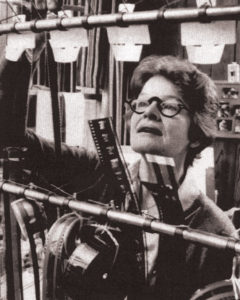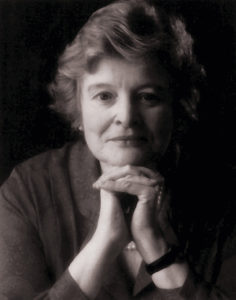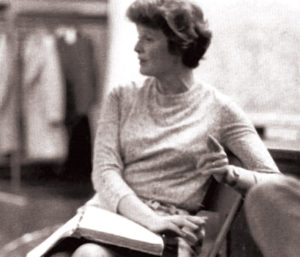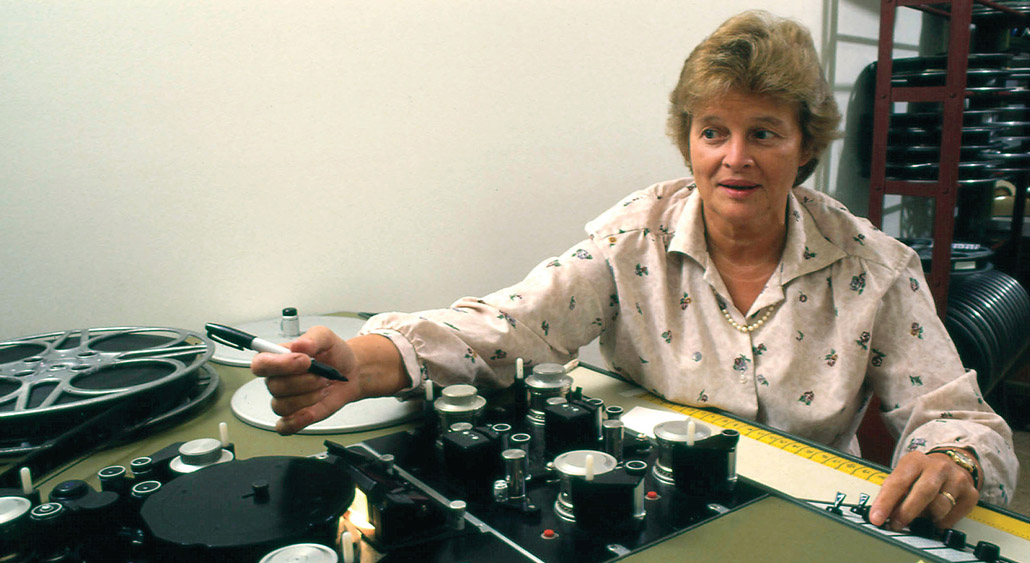by Kevin Lewis
“She doesn’t wince when revolver is discharged,” reads the headline from a 1915 newspaper account about the ability of actress Dorothea Carothers to stand immobile while a handgun explodes near her ear onstage in the crime caper Under Cover. That description could just as easily apply to her daughter, legendary film editor Dede Allen, ACE. Allen, who became a mentor to a generation of film editors, never winced when she had the proverbial gun to her head during post-production. Likely little in life has made Allen flinch; at 83 years old, she is still editing movies.
During the 1950s and ‘60s, Allen was a working mother with two young children––in New York no less––married to a television producer, Stephen Fleischman, to whom she is still happily married after 62 years. Her “work” included editing motion pictures by such directors as Robert Wise, Arthur Penn, Robert Rossen, Elia Kazan and Sidney Lumet, among others. Later on, she would edit the films of another generation of prominent directors, including Warren Beatty and Curtis Hanson. If Wise was known as the Editor’s Director, then Allen is the Director’s Editor.
By either happenstance or design, Allen has edited some of the prescient motion pictures of the 1960s and ‘70s. She solved the logistical problems of such historical epics as America, America (1963) and Reds (1981), and re-invented conventional crime narrative with her innovative cutting on Bonnie and Clyde (1967), Serpico (1973) and Dog Day Afternoon (1975). Her tight, precise editing of The Hustler (1961), with brilliant dissolves and montages, convinced us that we were in those dank, claustrophobic pool halls for days––a remarkable feat as the film was shot in Cinema-Scope, no friend to intimate moments. Rachel, Rachel (1968), directed by Paul Newman, was more genuine Inge than William Inge himself because Allen’s brilliant sound and picture editing, minimal music and maximum atmospheric sound effects made us feel the aridity of the landscape. She is perhaps most famous for her use of overlapping sound to connect scenes, an innovative pacing device.

Dede Allen.
her films, this editor did not follow convention in pursuing a career in the film industry. Dorothea Carothers Allen, named after her mother, could have settled into a quiet, upper-middle-class Midwestern existence if she had stayed in Cincinnati, Ohio. But like her mother, she wanted to see the world. Her mother was pressured into retiring from acting when she married, and an unhappy marriage and early widowhood only increased her wanderlust. While traveling, she placed her two daughters, Dede and her sister, Manette, in boarding school in Switzerland from the time Allen was three until she was ten. Allen’s father was killed in an automobile accident when she was still very young. She lived with her mother, and then various relatives, until she went to college.
But Allen knew she wanted to work in the film industry and left college. Her grandfather, Robert Carothers, whom Allen calls “a frustrated theater buff,” though he was a prominent surgeon, called in a favor to family friend, director Elliott Nugent and got her a job at Columbia Pictures as a part-time messenger in 1943. She soon gained employment in the sound department, where she learned a great deal about sound editing. By 1945, though, she married Fleischman, a filmmaker, and in 1946, they moved to Europe for his work. They remained overseas for about five years and Allen worked as a translator.
Fleischman was hired by CBS-TV in New York as a producer, and in 1951, their son Thomas was born. For the next few years, Allen did sound effects and sound editing in television and in film venues around New York. Soundman Dick Vorisek liked her work, knew she had the concentration, memory and artistic instinct to be a film editor and got her the position of picture editor with director Robert Wise on Odds Against Tomorrow (1959), which was produced and posted in New York.
Allen quickly earned the respect of her peers. In 1977, when Film Comment conducted a poll of editors to select the top ten film editors from the beginning of cinema to that point, Allen made the cut, along with veteran editors, some of whom had careers lasting half a century. At that time, she had been an editor for 20 years with 15 film credits.
Perhaps her one-time editing partner Craig McKay, ACE, has the answer to her longevity and the respect she commands. “When I worked with Dede, she was willing––and wanted––to hear what I had to say and what I could contribute; I think that was the case for most of the people she worked with,” McKay relates. “There was a lot of flexibility about her. Whatever she had to be, she could be. As far as working with Dede on a day-to-day basis, she had specific ideas about things, and she wanted to implement them, but she was willing to listen to what other people had to say. She helped create a lot of very successful careers.”

Dede Allen.
McKay credits Allen’s unbound passion for her work as a secret of her success. “She invited me to do the picture Reds as her partner,” he recalls. “We had an exciting creative relationship, but it was a difficult job. We were cutting for two years, six or seven days a week.” Reds had a massive production and post schedule as complex as the Russian Revolution it celebrated, and Allen and McKay oversaw over 60 assistants on that film.
It is difficult for Allen to discuss her methodology. Even at the Academy of Motion Picture Arts and Sciences tribute to her in New York last year, the directors with whom she worked acknowledged that fact. Which is probably one of the reasons they love and admire her: She is their biggest booster.
Allen has been regarded as an editor auteur by some academic critics, a notion she herself would reject––but there is a kernel of truth in that assessment. Though she neither wrote nor directed the movies she edited, there is a definite editorial signature to her films. Films that were interpreted as political at the time they were created––such as Bonnie and Clyde, Little Big Man and Dog Day Afternoon––can now be seen as post-political. Why? Because Allen always edited from a personal point of view. The violence in both Dog Day Afternoon and Bonnie and Clyde is enacted daily in our news and those films can be viewed as personal frustrations by the criminal against society. Though Bonnie and Clyde and Dog Day Afternoon were produced during the politicized Vietnam era, they have dated less than many other acclaimed movies of that era because the editor concentrated on character and acting rather than trendy cross-cutting.
Allen has always maintained that she edits from her gut, which is not entirely convincing to anyone who appreciates her classic, documentary, almost mathematical style. But there is truth in that statement. Allen understands life, psychology and the rough choices everyone has to make. And, like her mother in that long ago crime drama, she doesn’t wince when the characters die. But she feels their pain, and edits their scenes as if they were happening in real time before her.
Allen recently spoke to CineMontage about her career and philosophy.
CineMontage: How did you develop a love of film?
Dede Allen: I think I developed my interest in film because my mother had been an actress. My grandfather was an orthopedic surgeon and he loved the theatre, so he took me all the time. But my mother took me to the movies a lot because she loved them. When I lived with her ––which was not that often––we would go all the time. In Tryon, North Carolina, they changed the movie almost every day. We were down there for a winter and I went to the movies every day. Tryon was a wonderful town. It had a lot of artists––the Fitzgeralds lived there––and my mother liked it. It was the only time I really lived with her. Otherwise, I lived with my grandparents, or with aunts and uncles. My mother was like a Gypsy. She loved to move on. She loved to travel and she wasn’t very much into raising kids.
“I love actors. It takes a lot of patience. You go through the stuff and find these little jewels and gems and then you put them together in a certain way and it becomes something else. It takes perseverance.” – Dede Allen
CM: How did you begin as an editor?
DA: I started as a messenger at Columbia Pictures. I got into sound, which is great because sound is a wonderful background for editing in terms of rhythm. Of course, I later got into picture and loved it.
CM: The scenes in your films have minimum of score and a maximum use of source music, background and atmospheric sound––oftentimes no sound.
DA: My years as a sound editor were very, very important because they gave me a tremendous grounding and a lack of fear of sound. Sound and silence are so important in a film. I’m very pleased that I came out of sound because I think it helped me become a better picture editor.
CM: When you gave a seminar at Ohio State University in 1976, you discussed how old Hollywood movies covered up defects in performance by using wall-to-wall music and sound.
DA: That’s true. They didn’t understand silence. You have to remember those were the days of Max Steiner and Dimitri Tiomkin, when the music department was the master. Music people were always considered much higher than the sound people. Re-recording mixers were just re-recording mixers then. That was before people began to understand the art of re-recording, and everything was just clobbered with music.
CM: Would you speak about Dick Vorisek?
DA: Dick died a long time ago [1989]. I loved him; what a wonderful artist he was. He was the one who gave my son [Tom Fleischman] his chance because, he said, he’d watched me bring along assistants and apprentices over the years, and he’d never done that, so he started Tommy off. Tom is now one of the best dialogue editors in the world.
“You don’t pick your projects; the director comes to you.” – Dede Allen
CM: Did you ever discuss your sound techniques with Tom?
DA: You don’t sit around with your son and discuss techniques! I think Tom was around me a lot and he is a terrific learner; he learns from everybody. It was part of his upbringing. We actually worked together on Reds, but we didn’t work together that much; I wish we had. My favorite film was Reds. Warren Beatty was wonderful to work with.
CM: Vorisek was also responsible for you getting the job as editor for Robert Wise’s Odds Against Tomorrow in 1959. What challenges did you face editing that film for a known director?
DA: Well, he was a big director and he was a famous editor, so I was terrified. But we had a wonderful relationship. I adored Bob; he was a wonderful man. We were splicing with black leader so that it wouldn’t blink or flash. You lost a frame every time you made a cut. The first Saturday that Bob looked at my cut, which was just full of black things, he smacked me on the knee and said, “Good girl. I like to see that; you’ve been struggling with that scene.” When you get that kind of encouragement, it makes your juices flow. He loved the energy of the faster cutting.
CM: One of the most admired sequences by editors is the death of Sunshine in Little Big Man.
DA: Oh, that’s a wonderful scene. That was a special scene where I was cutting without sound after a while because it was such a big sequence. And when it came to driving her out of the teepee, and her running toward the river with the baby, she was shot and Little Big Man let out a yell. I was so upset at that point that I left the sound out. It was silent. And it so moved me that I never put the sound back in. He falls and he cries and cries, but there is no sound coming out of him, so it’s very moving. But it happened because I was cutting silent in order to go faster. I often cut silent, since I started as a sound effects editor and had cut sound for so many years. I did a lot of that on Bonnie and Clyde too.

Dede Allen speaking at Columbia University in 1973.
CM: Your editing follows the movement of the actor, and you find the definitive moment for an emotion. You know what the actor is thinking.
DA: I love actors. I think it helped having come from a theatre background, because of my mother and my grandfather. I am very much an actor’s editor and a director’s editor. And it takes a lot of patience. You go through the stuff and find these little jewels and gems and then you put them together in a certain way and it becomes something else. It takes perseverance. I wouldn’t let it go if I thought I could make it better.
CM: You have edited some of the best films about masculine identity, men in angst, grief and emotional trouble: Odds Against Tomorrow, The Hustler, Bonnie and Clyde, Alice’s Restaurant, Wonder Boys, Dog Day Afternoon… Were you sensitive about that subject?
DA: Well, that’s interesting, since I was slightly orphaned, to say the least. I never thought about that. My father died before I was four and my mother put me on the Magic Mountain [the school in Switzerland]. I thought it was glamorous when I was young, but later on in therapy, I learned I was basically orphaned.
CM: It’s incredible how many of your projects were male oriented rather than female oriented.
DA: I never looked at it that way. But you don’t pick your projects; the director comes to you.
CM: It is amazing that you pursued a career in motion picture editing in New York, where film production had diminished in the 1950s and 1960s. You had small children and worked long hours, managing teams of editors and budgets. When you gave the seminar at Ohio State University 30 years ago, did you inspire the women in the audience?
DA: It was just when women’s liberation was happening. There were two young women sitting in the front with their feet on the rail, kind of defiant. One of them said to me, “What do you know about women’s lib?” I laughed and said, “I beg your pardon. I am women’s lib.”


